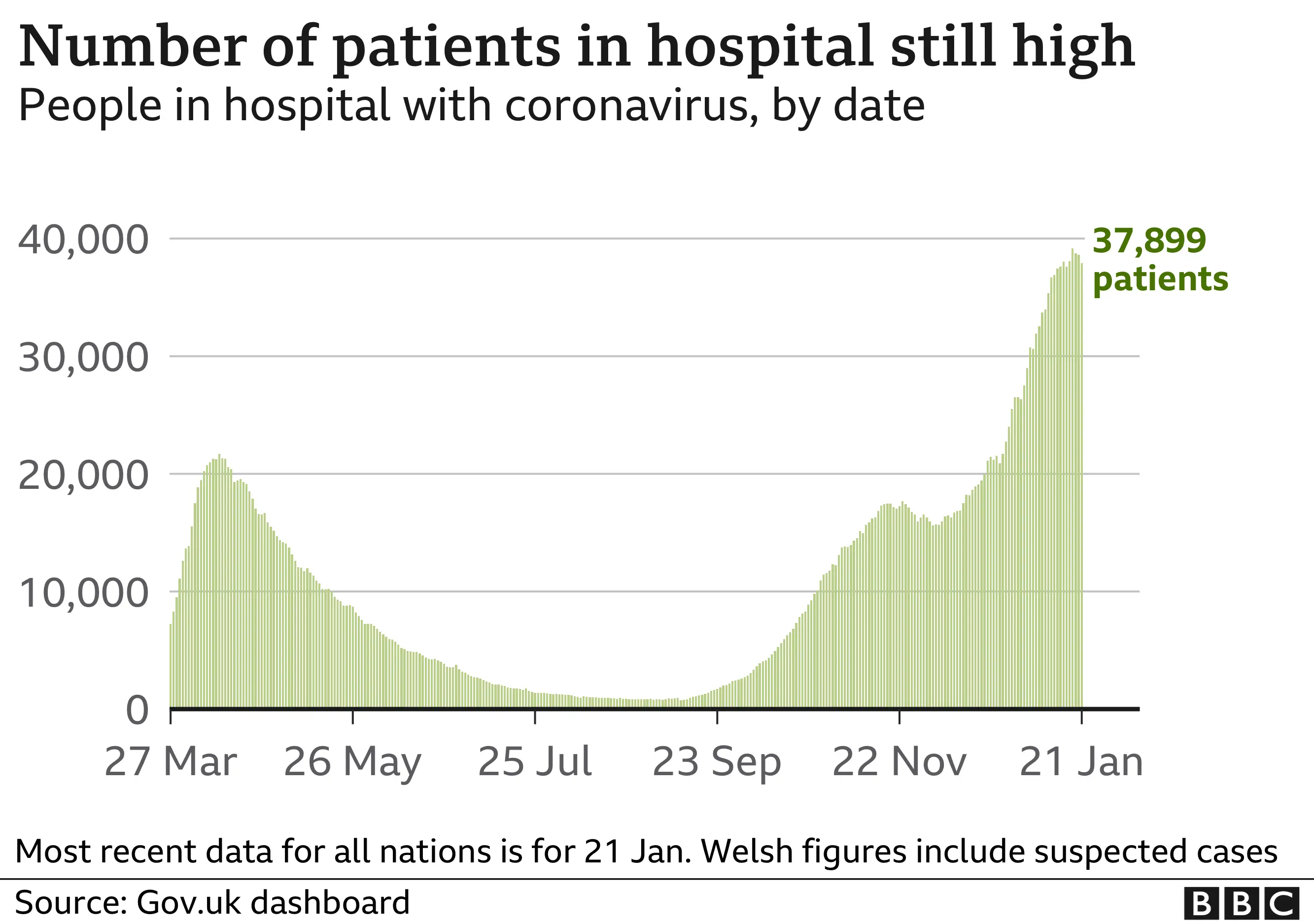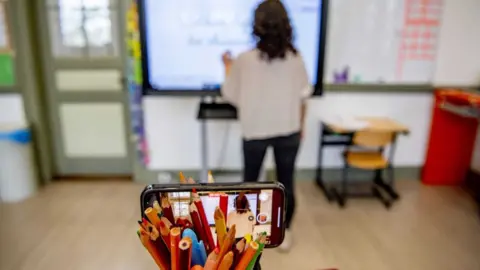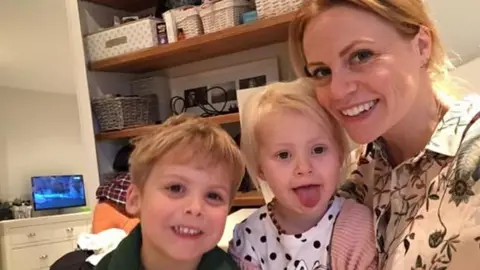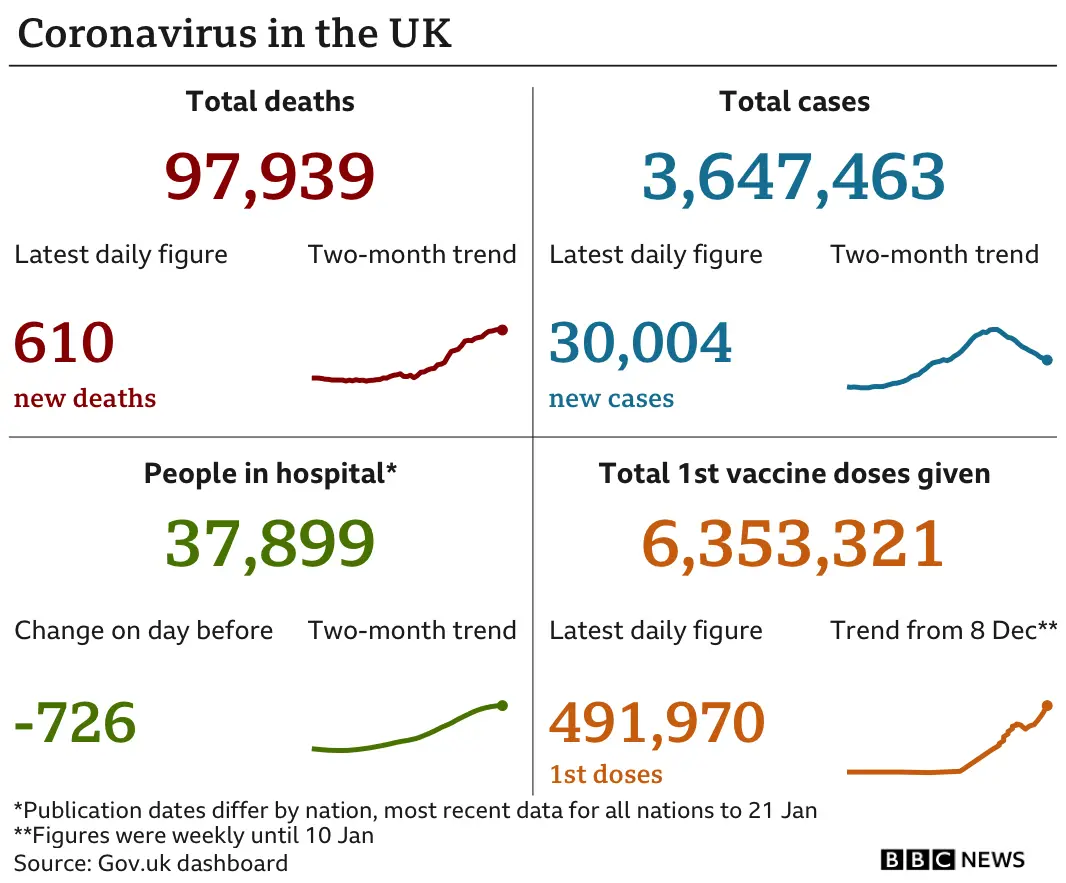Covid: Schools will be told of reopening plans 'as soon as we can'
The government will tell teachers and parents when schools in England can reopen "as soon as we can", the prime minister has said.
MPs have called on the government to set out a "route map" for reopening amid concerns for children's education.
Boris Johnson said he understood why people wanted a timetable but he did not want to lift restrictions while the infection rate was "still very high".
He would not guarantee schools would reopen before April's Easter break.
Mr Johnson said: "We've now got the R [reproduction rate] down below 1 across the whole of the country, that's a great achievement, we don't want to see a huge surge of infection just when we've got the vaccination programme going so well and people working so hard.
"I understand why people want to get a timetable from me today, what I can tell you is we'll tell you, tell parents, tell teachers as much as we can as soon as we can."
He said the government would be "looking at the potential of relaxing some measures" before mid-February, with Downing Street clarifying that this meant looking at the data to decide "what we may or may not be able to ease from 15 February onwards".
A further 592 people have died in the UK within 28 days of a positive Covid test and another 22,195 cases have been recorded, according to Monday's government figures.
At Monday's Downing Street press briefing, Health Secretary Matt Hancock said almost four in five of the UK's over-80s have had the vaccine, with nearly 6.6m people in total having had their first dose.
But he said the NHS continues to be under "intense pressure", with Jenny Harries, deputy chief medical officer for England, saying there are "twice the number of people in hospital than we had in the first wave" of the pandemic.

Robert Halfon, chairman of the education select committee, told BBC Breakfast there was "enormous uncertainty" and called for the government to set out what the conditions needed to be for pupils to return to schools.
The Conservative MP for Harlow suggested the government could consider tighter restrictions in other parts of society and the economy, in order to enable schools to open.


Tory MPs were enraged by reports over the weekend that schools might not re-open fully until after the Easter holidays.
Ministers say it's the progress of the pandemic that will determine their decision rather than a pre-agreed timetable.
Yet whenever the government speaks, parents hear dates. Whether it's that the situation will be reviewed at half-term. Or a pledge to give two weeks' notice when classes will come back.
MPs are now pushing for more transparency from the government about how they'll assess the data, and for some ideas between school being mostly closed or totally open.
This issue is a perfect metaphor for the situation facing the entire country. Too much hope breeds disappointment, but living with uncertainty is just as hard. And you can come up with a plan but it might have to be junked if the virus has other ideas.

Children's Commissioner for England Anne Longfield joined the call for clarity and told the BBC: "Children are more withdrawn, they are really suffering in terms of isolation, their confidence levels are falling, and for some there are serious issues."
Education Secretary Gavin Williamson said the government wanted to "see all children back at the very earliest moment".
Schools in England have been closed to most pupils since the national lockdown began on 5 January due to high levels of Covid transmission in the community.
There have been calls for teachers to be vaccinated sooner, although it is not clear if that would allow schools to reopen earlier.
 PA Media
PA MediaCovid death rates among educational professionals are not "statistically significantly different" to those in the general population, according to Office for National Statistics (ONS) data, but secondary school teachers appeared to have an elevated risk compared particularly with people working in office-type jobs.
Among secondary school teachers Covid death rates were 39.2 deaths per 100,000 males, compared with 31.4 for all males aged 20 to 64, and 21.2 per 100,000 females, compared with 16.8, but the ONS said these were "not statistically significantly different than those of the same age and sex in the wider population".
Schools will remain closed in Northern Ireland, Scotland and Wales until at least the February half-term - with the Welsh first minister saying it is "unlikely" all pupils will return after the break.
 Gemma Cocker
Gemma CockerGemma Cocker from Brighton is one of the many parents struggling to balance childcare, home learning and work.
She says she's having to share her work laptop with her son, who has already missed learning time after the family moved home and did not have internet access. "We didn't have any internet. The school said they had reached their limit so couldn't take him," she says.
And because her children are young, she says: "They're never just going to watch a classroom by themselves, you have to be with them the whole time."
Kitty Jones, 11, is in her last year of primary school and she says home learning is "tricky" because she is not used to using different remote platforms like Google Classroom and she wants to return "as soon as possible".
"I still think that I'm learning a bit, but I don't think I'm learning as much as I would be in person," she tells BBC Radio 4's World at One programme.
Holly Agbukor, 18, is studying for her A-levels, says it is "quite stressful" learning at home, as it is a "different environment, so it is not as easy to be fully present in the lessons".
But, she says, while is it "difficult" working at home, "I don't think it is worth the cost of reintroducing the virus into society and making things worse overall".

- LOOK-UP TOOL: How many cases in your area?
- SOCIAL DISTANCING: Can I give my friends a hug?
- JOBS: Can my boss force me to go to work?

In other developments:
- Scientists have said there is a chance a variant first detected in South Africa may impede the effectiveness of current vaccines
- Ministers will meet this week to consider imposing tougher restrictions on people arriving from abroad, including the possibility of quarantining travellers in hotels
- Meanwhile, Labour leader Sir Keir Starmer has announced he has to self isolate once again after being notified that he had come into contact with someone who has tested positive for coronavirus.




How has home-schooling been going for your family? You can share your experience by emailing haveyoursay@bbc.co.uk.
Please include a contact number if you are willing to speak to a BBC journalist. You can also get in touch in the following ways:
- WhatsApp: +44 7756 165803
- Tweet: @BBC_HaveYourSay
- Please read our terms & conditions and privacy policy
If you are reading this page and can't see the form you will need to visit the mobile version of the BBC website to submit your question or comment or you can email us at HaveYourSay@bbc.co.uk. Please include your name, age and location with any submission.
